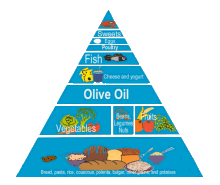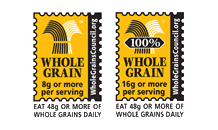Are You Ready for Mediterranean Food
to Make a Big Splash in the U.S.?
by www.SixWise.com
Some Americans have already discovered the Mediterranean
diet -- rich in fruits, vegetables, olive oil, beans, whole
grains and fish, and praised for its heart and overall health
benefits. But it is now poised to make a far bigger splash
in the U.S.
|

You may soon find yourself searching the grocery store
for foods that contain the Mediterranean diet seal of
approval.
|
Oldways, the non-profit group that popularized the Whole
Grains Stamp that's now on about 850 food products, plans
to begin a major promotional campaign aimed at popularizing
the Mediterranean diet here in the United States. The campaign
will focus on public education to raise awareness about the
diet's health benefits, and will include the launch of a new
stamp for foods that fit in with the diet.
"The new scientific evidence is there. The second step
is to communicate this evidence to consumers, and the third
step involves connecting the science with specific foods,"
said Oldways president Dun Gifford.
"We expect the education campaign to last four years
as that's how long something like this takes to be effective
and develop durability. Merchandisers and food manufacturers
need to know that this is something they can trust, something
that will be around for a long time and something that will
get the attention of people," he continued.
What Exactly IS the "Mediterranean Diet"?
|

(Click
to Enlarge)
The Mediterranean Food Pyramid, created by Oldways,
emphasizes fruits and vegetables, olive oil and whole
grains.
|
Although the Mediterranean diet varies by region, the American
Heart Association lists these five components as the foundation
of the typical Mediterranean diet:
-
High consumption of fruits, vegetables, bread and other
cereals, potatoes, beans, nuts and seeds
-
Olive oil is an important monounsaturated fat source
-
Dairy products, fish and poultry are consumed in low
to moderate amounts, and little red meat is eaten
-
Eggs are consumed zero to four times a week
- Wine is consumed in low to moderate amounts
The Mediterranean Food Pyramid (see image at right), created
by Oldways, is patterned after the USDA Food Guide Pyramid.
Supported by both the Harvard School of Public Health and
the World Health Organization, the Mediterranean Food Pyramid
points out the major differences between Mediterranean and
American diets. The Mediterranean diet:
-
Includes more fruits and vegetables
-
Has a greater focus on fish, cereals, legumes and whole
grains, and less on red meats
-
Encourages use of olive oil and nuts as healthy fats
Why Eat a Mediterranean Diet?
|
Have You Seen the
Whole Grains Stamp?

The Whole Grains Council, Oldways' subsidiary, introduced
the Whole Grains Stamp in 2005 to help consumers easily
identify food products that contain whole grains.
Now used by 87 companies on almost 850 different food
products, the stamp can only be used on products with
at least half a serving of whole grains. The U.S. Dietary
Guidelines recommend that adults eat at least three
servings of whole grain each day, which can be met by
eating three whole grain food products labeled with
a "100% Whole Grain" stamp -- or six products
bearing ANY Whole Grain Stamp.
Oldways' next project, The Mediterranean Stamp, is
expected to be just as well-received as the Whole Grain
Stamp.
|
The Mediterranean diet is nutrient-rich, including beneficial
components such beta-carotene, vitamin C, tocopherols, polyphenols
and essential minerals. It has been found to protect against
heart disease, extend life, and fight certain cancers.
"The Mediterranean diet is of course not new ...
We know it tracks back to the Phoenicians, the earliest expansive
traders that carried olives and olive oil to the Mediterranean
coastline," said Gifford.
"In 2006, 2,800 years later, we know that the Mediterranean
diet is as healthy an eating pattern as there is anywhere
in the world. Fifty years of very high level science, basic
and applied, repeatedly confirms this hypothesis," he
says.
Among the more recent studies pointing to the health benefits
of the Mediterranean diet are:
-
A Greek study that found the diet could benefit people
with existing health problems.
-
Another Greek study that found people who followed the
diet were 60 percent less likely to be obese than those
who did not.
-
A U.S. study that found the diet could decrease the risk
of Alzheimer's disease by 68 percent.
-
A 2004 health claim approved by the Food and Drug Administration
(FDA) that olive oil may reduce coronary heart disease.
According to Oldways, food manufacturers are eager to respond
to consumers' demands for healthier foods, and they expect
the Mediterranean diet to catch on fast. Aside from the extensive
science backing up its health benefits, the diet is consumer-friendly
in two important ways: it tastes good and it's non-restrictive.
A large number of existing products, including fresh and
frozen vegetables, vegetable meals, stews and pasta meals,
are ready to carry the Mediterranean seal of approval, but
Oldways expects that "hundreds and hundreds" of
products will be associated with the Mediterranean diet within
a few years.
Recommended Reading
The
6 Healthiest Staple Foods in Greek Cuisine
10
Top Foods to Help You Fight High Cholesterol
Sources
FoodNavigator-USA.com
November 13, 2006
FoodNavigator-USA.com
November 9, 2006
The
Whole Grains Council
Forbes.com